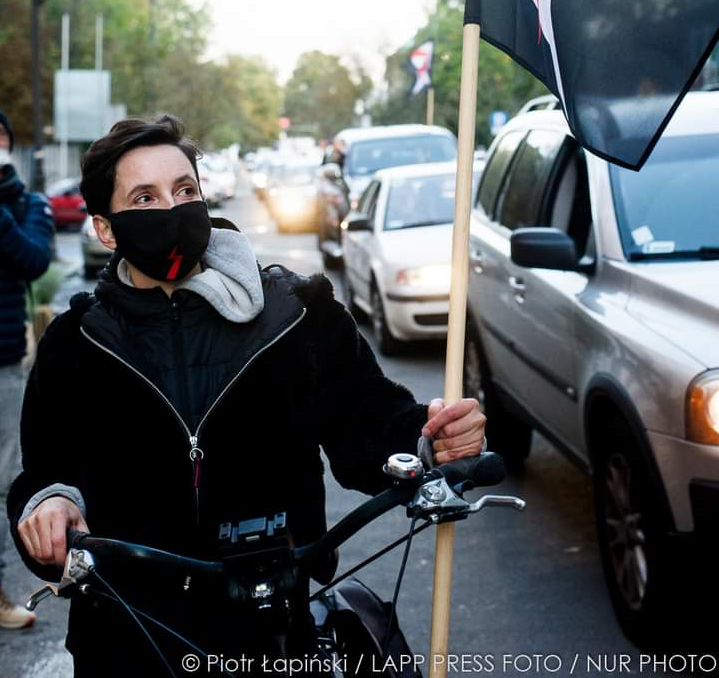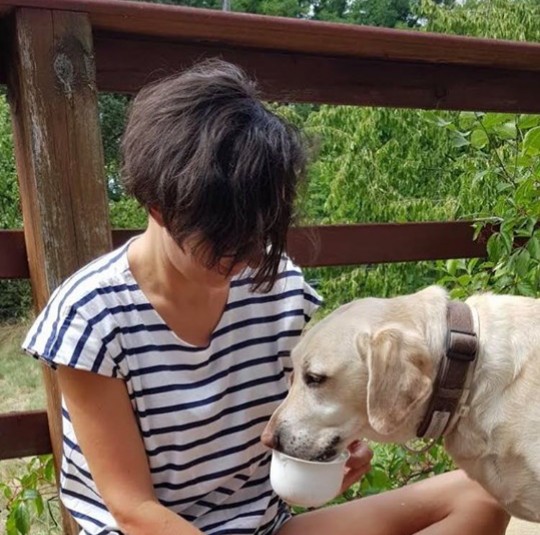
Klementyna is pragmatic when she talks about the challenges women’s rights defenders face in Poland; an act of self-preservation in the face of mounting charges brought against her by the current ultra-conservative PiS government. She has been accused of inciting and leading protests in the wake of increasingly regressive abortion legislation in the country.
”I have a lot of legal cases pending but there is no conclusion or sentencing. The case laid against me for organising and leading protests in 2020 is worrying as they can give you up to eight years in prison but it was already rejected by the court once. There wasn’t any proof so it was baseless. To me, it is a political move and they need a scapegoat.
‘We have elections next year, so they can use the cases to stop us organising protests. This is a way to keep us quiet.’
The activist doesn’t even receive notifications about her cases from the courts. Instead, she ends up hearing about them in the media. Klementyna believes it’s likely her case will be deferred again as the papers submitted this time around are the same ones that were rejected previously but she remains cautious: ‘You never know, they might change the charge and find a more willing judge. Legally the case is very weak but they have ways to manipulate these cases to use it against us. We have elections next year, so they can use the cases to stop us organising protests. This is a way to keep us quiet.’
Klementyna, a researcher by profession, first got involved in activism in 2016 after the ban on abortion was presented in the Polish parliament. The proposal sparked outrage across the country and Polish women came together in nationwide protests known as the ‘Czarny (black) protests’. The first of which was on Monday 3rd October. Thousands of women across Poland took to the streets wearing black to strike against the near-total ban on abortion which sought to criminalise women for having an abortion, even in the case of rape and foetal abnormality. From this, The Women’s Strike was born.
What started as a movement to defend women’s SRHR, has become a movement to defend democracy.
”It all started for me when the idea of a ban of abortion was presented in parliament. Like many others, I engaged in the protests and from there I became part of the movement. I had a 13-year-old daughter and couldn’t believe that she might have her reproductive rights more restricted than I ever had. With the end of communism and the start of capitalism we were more protected and had more rights. We imagined the 21st century would be heaven for women but actually it’s far from fantastic and the future for my daughter is not looking very bright. I thought to myself, I am not letting it go this way.
What started as a movement to defend women’s SRHR, has become a movement to defend democracy. Thanks to the protests and the brave women putting themselves on the front line, the government backtracked on their plans.
‘We became such a large platform. We were engaging in different protests from climate activism to disability rights,’ Klementyna adds but says the war in Ukraine and the situation on the border with Belarus has brought additional challenges.
Equally, her position as a researcher gave her the impetus to start investigating the funding streams supporting opposition to women’s rights.
Patterns emerge related to the opposition to women’s rights

”Something strange was going on. At the time, the US presidential campaign for Trump was underway. I noticed odd links between Poland, South Korea, Argentina - which was my field of research for years - and Russia. I was surprised to see similar issues concerning women’s rights happening in so many other places in similar ways. There was a pattern.
Klementyna wrote a book years before on the mechanisms of revolution in the case of Cuba and she noticed comparable patterns emerging: ‘I started collecting these examples and looking at them closely. I began to merge this big investigation that led me to publish my book in 2020.’
She maintains that although feminism has always been a political issue, it has become geopolitical: ‘There is a high-powered network involving conservative and religious groups with aggressive policies, many were already known in the US. But a large number emerged in the same year which caught my attention – 2013. It became a crucial year and it wasn’t hard to discover Russia was behind it. In 2013, Putin became president for the third time even though under Russian law you can only be president twice. There were big protests and arrests. A lot of middle-class people were imprisoned, and this was the start of his fight to survive.’
In her book, Klementyna outlines that Putin’s cabinet, advisors and secret service launched a policy of conservative Christian values and Putin began promoting himself as the leader of Christian values.
‘The invasion of Ukraine is a war against The West.’
”They used soft language initially but today it’s becoming bolder. He calls The West ‘Satan’ and argues Russia is the only country with moral values. The invasion of Ukraine is a war against The West. What was speculation years ago has become clear today. If Russia wasn’t involved, we wouldn’t have such an issue. They are a big player and always vote against human rights. It’s a coalition of forces from Saudi Arabia, Russia to the Holy See. They are Anti-everything.
The activist has been investigating this well-funded network of ultra-religious and conservative organisations across the world for some time and argues that the backlash against human rights is not a natural progression:
‘They share tactics through umbrella institutions. Large events like UN forums and The World Congress of Families provide a platform for these groups to meet, discuss and spread their narratives. It’s a massive attack and it’s unprecedented. The history of humanity is always divided between progressive people and those who are less progressive. But in recent years, this global campaign has managed to achieve similar things across different nations from Guatemala to the US and Poland. They are artificially fuelled by different things and one of them is money.’
Ultra-conservative foundation ‘Ordo luris’ in Poland has filed a SLAAP suit against Klementyna for her book but so far there has been no further action taken.
Klementyna says that these conservative foundations and ultra-religious groups have begun to lose funding since the Ukraine war erupted. They are openly fundraising, and the activist says the partnership with the current government will become crucial in this. Ordo luris have recently launched a crowdsourcing campaign in what it calls their ‘court battle against abortionists and the abortion business’.
Although she is hopeful that change will occur, she is not sure whether the elections will happen next year. Klementyna believes this new wave of anger coupled with the desire for more progressive solutions will be wide-reaching and part of a larger movement for change, one where she isn’t sure if women’s rights will be the leading force:
‘We don’t know if there will be elections. Poland has become a mafia state, so the government has a lot to lose. They are desperate to defend themselves. It will be dramatic, there’s a lot of anger out there. It’s gone beyond women’s rights to economics and there might even be riots. Nobody knows what’s going to happen. But I do believe there is energy for change; people are very upset, inflation is up, the economy is down and regular people in Poland feel they are becoming poorer. In some cases, many don’t have enough to survive. The winter is coming and with that comes heating and gas issues. The ongoing war brings up a lot of questions and the situation isn’t stable. PiS are losing their majority support all over Poland.’
Healthcare for Polish human rights defenders should be covered by the EU
With this, she says the EU can and should do more to support women’s rights activists in Poland. For Klementyna, encouraging activists to become involved in politics would be a start. She argues basic things like healthcare for Polish human rights defenders should be covered by the EU:
‘It’s connected to physical risk. Funds should be created. People are quite depressed and that makes it harder to engage. With the war in Ukraine, activists are burned out. They need incentive and security to engage again as they have lost a lot financially. People have invested in those fleeing the war in Ukraine by receiving refugees and it’s draining people’s pockets. I also think a secure channel should be created for people to escape if needed. The government can link defenders to protests so they could come to our homes and arrest us.’
Maintaining mental security in the face of adversity is absolutely key to keeping the movement afloat and Klementyna says stepping back has given her strength:
‘Many people left their jobs to engage. For some, it has taken five years of their lives. It’s impossible to live like that. They don’t take breaks. I can still do what I love to do. I keep fit which helps for body and mind. I have become detached from the tiny ongoing issues and concentrate on bigger things. There are moments of peace. Moments when I feel that I am not needed and I just do my job, only returning for the ‘hot periods’. It’s hard to spend your whole life devoted to revolution. I divide my energy and life into different fields so when it comes around, I can be fit again.’
Story by Dearbhla Crosse.
